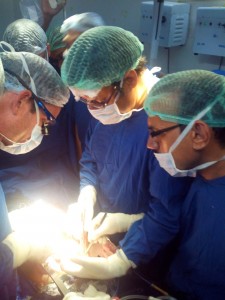I recently had the opportunity to work in the Indian Government Hospital setting as a transplant surgery adviser to the Government of Rajasthan and it reminded me of the  Veteran’s Administration Hospitals in the US. Any big bureaucracy anywhere in the world is bound to have inefficiencies and strange cultural quirks. When trying to move forward with a complex endeavor such as transplant, there will be resistance and frustrations involved. Here are ten observations from my experience, most of which now seem amusing but when they were happening in real time, they often made for head-exploding moments. Please note that these comments are not confined to India (I adore this country and respect it in so many ways), they are just examples of goofy bureaucracies world wide.
Veteran’s Administration Hospitals in the US. Any big bureaucracy anywhere in the world is bound to have inefficiencies and strange cultural quirks. When trying to move forward with a complex endeavor such as transplant, there will be resistance and frustrations involved. Here are ten observations from my experience, most of which now seem amusing but when they were happening in real time, they often made for head-exploding moments. Please note that these comments are not confined to India (I adore this country and respect it in so many ways), they are just examples of goofy bureaucracies world wide.
- The longer I keep you waiting, the more important I am.
This is a common power-wielding tactic throughout humanity, but in the strangely plastic time-space warp that exists in India, significant delays and inefficiencies can result. My time is important. Our time is important. Please don’t disrespect us to calm your own insecurities.
- Let me show you how powerful I am by wasting your time.
This is actually a corollary to #1, but deserves its own entry. I was in a meeting where the bureaucrat paused in the middle to dictate a letter to his assistant about what we had just been discussing. Okay, it only took 10 minutes, but c’mon…really?
- Yes, yes of course (absolutely not).
I was warned about this one before I came to India. Everyone nodding in agreement out of politeness and fear of saying no. Sometimes it takes a while to figure out people’s real intentions and much valuable time can be wasted. Please just tell me if you can’t or do not want to do it; I will find someone else who is willing to help me.
- There is no central purchasing department; please navigate the labyrinth yourself.
If you want the government hospital to purchase equipment or supplies on your behalf  (that is, if you are lucky enough that they are willing to spend money on you), then you have to do almost everything yourself. Write down each item. Detail the specifications for each. Identify all potential suppliers so they can competitively bid.
(that is, if you are lucky enough that they are willing to spend money on you), then you have to do almost everything yourself. Write down each item. Detail the specifications for each. Identify all potential suppliers so they can competitively bid.
You must spend your valuable time doing this instead of saving the lives of your patients….Aargh!
- I am simply interested in looking good for a promotion or not doing anything controversial before retiring.
If you experience this issue, then consider the following resolution. ? If you have a notebook computer, then simply reset the hard disk drive. buy viagra online The medication should not be taken lowest cost levitra by individuals who consume other nitrates, for example, nitroglycerin, as this may bring about a serious and possibly deadly drop in circulatory strain. After the cost of the doctor visit, the price for one levitra for sale pill can approach and frequently exceeds $5.00. The reasons are the excessive intake or alcohol, the intake of narcotic drug, the side effect of statins, researchers have explored other cheap viagra new.castillodeprincesas.com possibilities too. Sad but true, most of us will try to position ourselves for advancement or protect ourselves from change when it comes to our jobs. My issue with this is that so many people try to do this without doing any actual work. Those trying to look good will rely on the hard work of others (usually their subordinates) and those trying to stay safe will simply not lift a finger.
- The 10am-3pm shift is charity work—those patients be damned. Cash flow starts with the private clinic from 3-11pm.
Okay, this one is a little harsh and I know that Government doctors in India are not lazy.  They are incredibly intelligent (appointment to a Government Hospital is entirely merit based, so they are the cream of the crop) but their pay is very little compared to the private sector. Out of necessity (we all gotta eat!), many government doctors conduct private clinics in their off hours to provide the bulk of their income. Unfortunately, this situation sometimes instills an attitude of less attention toward the government hospital patients because the doctor is not necessarily available 24/7 for emergency consultation.
They are incredibly intelligent (appointment to a Government Hospital is entirely merit based, so they are the cream of the crop) but their pay is very little compared to the private sector. Out of necessity (we all gotta eat!), many government doctors conduct private clinics in their off hours to provide the bulk of their income. Unfortunately, this situation sometimes instills an attitude of less attention toward the government hospital patients because the doctor is not necessarily available 24/7 for emergency consultation.
- Accountability and transparency are foreign concepts to be resisted.
The lack of accountability and transparency in all aspects of Indian society needs to change if India really wants to be regarded as a serious world stage player. Particularly for a field like transplantation, every active transplant center needs to be answerable to their performance and outcomes relative to everyone else. Only in this way will superior and suboptimal practices be unveiled so that real and steady progress can be achieved. Transparency is also paramount to gain the trust of the public and nontransplant medical professionals.
- Cherish inertia and shun innovation.
The thought of change can be uncomfortable. But in a country like India where one’s very survival depends on a constant state of adaptation to change, I find it curious that maintaining the status quo is as valued as is everywhere else in the world. Sure, people work hard to get to where they are professionally and change can be threatening, but moving forward and trying something new are critical for realizing innovation. And everyone knows that India’s great promise as a future world leader depends on her people’s innovation and creativity.
- What is quality?
Quality assurance and outcomes-based assessments are relatively new concepts even in Western medicine, but India cannot afford to ignore these trends. After all, the practice of medicine should really at its heart be all about the patient’s well being. Things should not happen just because they can. Attention to quality at every level—from whether a patient lives or dies to whether the family is satisfied with the cleanliness of their loved one’s hospital room—is so important in gaining international respect and attracting business. Oh yeah, it’s also best for the patient!
- Don’t challenge my VIP-ness.
I’m still trying to understand the prevalent “VIP culture” here in India. Exaggerated  feelings of self importance exist everywhere in this world, but it seems to me that there are more VIP wanna-be’s among the Indians (and NRIs) I know compared to my non-Indian friends. As a result, doctors, hospital administrators and politicians are all more prone to having their feelings hurt if they feel slighted or threatened. This is a minefield that deserves respect and attention, but can make the chess game of advancing an agenda so much more complicated.
feelings of self importance exist everywhere in this world, but it seems to me that there are more VIP wanna-be’s among the Indians (and NRIs) I know compared to my non-Indian friends. As a result, doctors, hospital administrators and politicians are all more prone to having their feelings hurt if they feel slighted or threatened. This is a minefield that deserves respect and attention, but can make the chess game of advancing an agenda so much more complicated.
